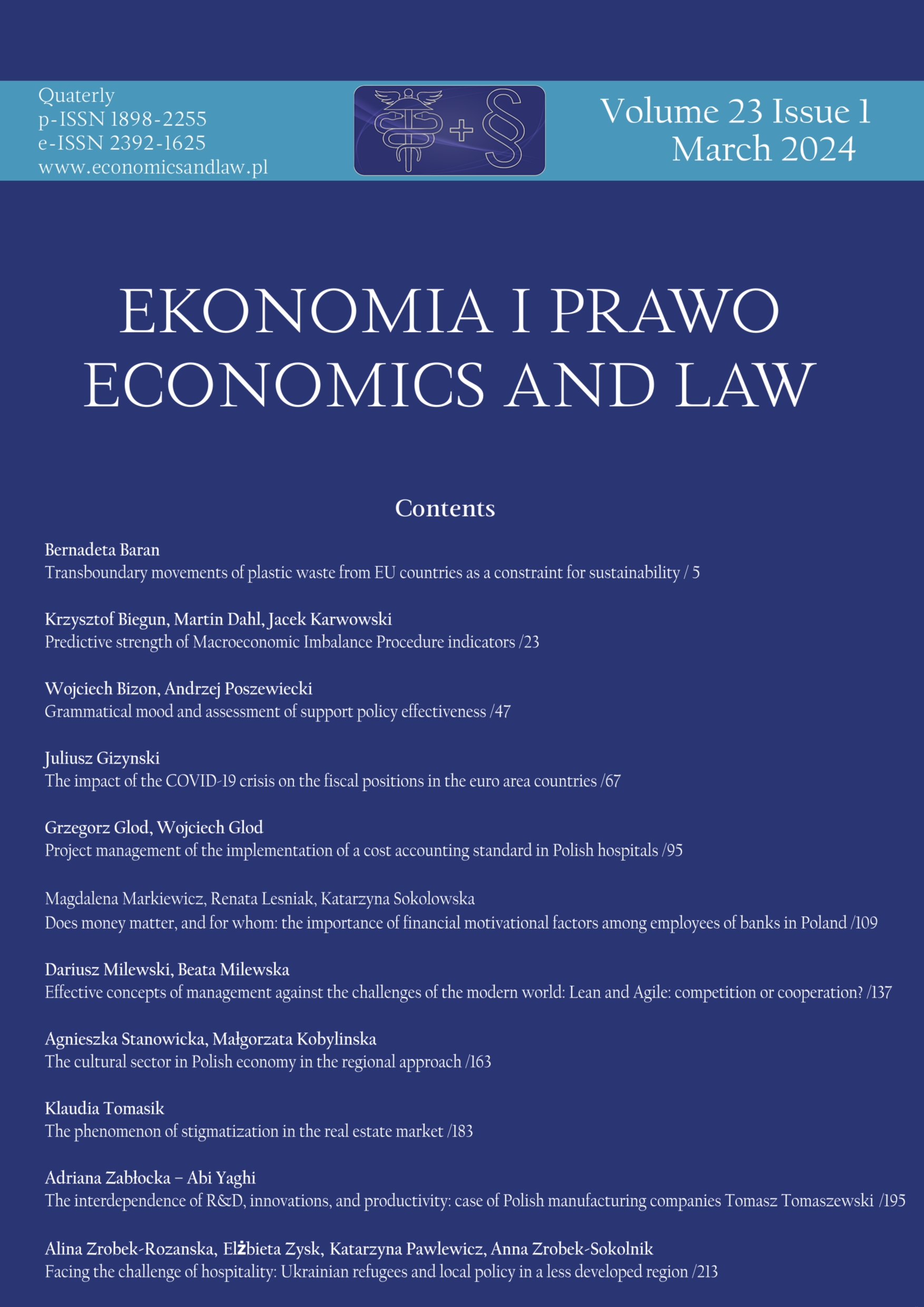Facing the challenge of hospitality: Ukrainian refugees and local policy in a less developed region
DOI:
https://doi.org/10.12775/EiP.2024.0011Keywords
refugees, migration, local policy, UkraineAbstract
Motivation: Since the beginning of the war, Poland has welcomed more than 1.5 million Ukrainian refugees. This new reality has put pressure on local authorities, especially those managing less developed, poorer regions with less experience in receiving immigrants, as they faced the sudden urge to accommodate the needs of these new arrivals.
Aim: This article aims to present the profile, needs, and potential of people who have found refuge in less developed areas (i.e., Warmia and Mazury). It helps to anticipate and understand Ukrainian migration — as the influx of refugees has long-term effects, requiring local authorities to take action, i.e., to ensure the availability of social services. Integrating thousands of refugees requires careful planning, developed infrastructure, and funds. It is also worth considering the benefits of the potential of new residents. Another purpose is to share objective knowledge on the effects of the ongoing war.
Results: Through the research, it has been possible to obtain a great deal of information about people who found refuge in a less attractive area for migration. Profile of the immigrant was created, and the needs in terms of social infrastructure and the set of advantages that immigrants can offer on the labor market were described.
References
Abdullah, A., Mbamba, C.R., Amponsah, E.B., Frederico, M., Cudjoe, E., Bentum, H., & Emery, C.R. (2023). Safeguarding the welfare of refugee children in Ghana: perspectives of practitioners in refugee camps. Children and Youth Services Review, 145, 106803. https://doi.org/10.1016/j.childyouth.2022.106803.
Andersson Joona, P., & Datta Gupta, N. (2023). Labour market integration of FRY refugees in Sweden vs. Denmark. International Migration, 61(2), 241–259. https://doi.org/10.1111/imig.13007.
Bocquého, G., Deschamps, M., Helstroffer, J., Jacob, J., & Joxhe, M. (2023). Modelling refugee migration under cognitive biases: experimental evidence and policy. Journal of Behavioral and Experimental Economics, 103, 101969. https://doi.org/10.1016/j.socec.2022.101969.
Brezis, E.S., & Krugman, P.R. (1996). Immigration, investment, and real wages. Journal of Population Economics, 9, 83–93. https://doi.org/10.1007/PL00003829.
Burrell, K. (2010). Staying, returning, working and living: key themes in current academic research undertaken in the UK on migration movements from Eastern Europe. Social Identities, 16(3), 297–308. https://doi.org/10.1080/13504630.2010.482401.
Burzyński, M., Docquier, F., & Rapoport, H. (2018). The changing structure of immigration to the OECD: what welfare effects on member countries. IMF Economic Review, 66(3), 564–601. https://doi.org/10.1057/s41308-018-0059-3.
Curran, S.R., & Meijer-Irons, J. (2014). Climate variability, land ownership and migration: evidence from Thailand about gender impacts. Washington Journal of Environmental Law & Policy, 4(1), 37–74.
Demirci, M., & Kırdar, M.G. (2023). The labor market integration of Syrian refugees in Turkey. World Development, 162, 106138. https://doi.org/10.1016/j.worlddev.2022.106138.
Dustmann, C., Fasani, F., Frattini, T., Minale, L., & Schönberg, U. (2017). On the economics and politics of refugee migration. Economic Policy, 32(91), 497–550. https://doi.org/10.1093/epolic/eix008.
Fröhlich, C.J. (2016). Climate migrants as protestors: dispelling misconceptions about global environmental change in pre-revolutionary Syria. Contemporary Levant, 1(1), 38–50. https://doi.org/10.1080/20581831.2016.1149355.
Ghorashi, H. (2005). Agents of change or passive victims: the impact of welfare states (the case of the Netherlands) on refugees. Journal of Refugee Studies, 18(2), 181–198. https://doi.org/10.1093/refuge/fei020.
Górny, A., & Kaczmarczyk, P. (2018). A known but uncertain path: the role of foreign labour in Polish agriculture. Journal of Rural Studies, 64, 177–188. https://doi.org/10.1016/j.jrurstud.2017.12.015.
Hainmueller, J., Hangartner, D., & Pietrantuono, G. (2015). Naturalization fosters the long-term political integration of immigrants. Proceedings of the National Academy of Sciences, 112(41), 12651–12656. https://doi.org/10.1073/pnas.1418794112.
Karaszewski, W., & Sudoł, S. (1997). Empirical research on the process of transformation of Polish companies in the period of 1990–1995. Uniwersytet Mikołaja Kopernika.
Kim, H., Kim, Y., Yoon, J., Nam, J.K., & Kim, Y. (2023). A phenomenological study on the North Korean refugees’ trauma experience and recovery process during the escape and resettlement in South Korea. International Journal of Intercultural Relations, 92, 101742. https://doi.org/10.1016/j.ijintrel.2022.101742.
Konle-Seidl, R. (2018). Integration of refugees in Austria, Germany and Sweden: comparative analysis. Retrieved 08.06.2023 from https://www.europarl.europa.eu/RegData/etudes/STUD/2018/614200/IPOL_STU(2018)614200_EN.pdf.
Krings, T., Bobek, A., Moriarty, E., Salamońska, J., & Wickham, J. (2013). Polish migration to Ireland: ‘free movers’ in the new European mobility space. Journal of Ethnic and Migration Studies, 39(1), 87–103. https://doi.org/10.1080/1369183X.2012.723250.
Mozetič, K. (2022). A help or hindrance: highly educated refugees’ perceptions of the role of civic integration programmes in accessing the labour market in Oslo, Malmö and Munich. Comparative Migration Studies, 10(8), 1–18. https://doi.org/10.1186/s40878-022-00279-z.
Nowosielska, P. (2022). Koniec miesiąca miodowego: czy mamy jeszcze siłę pomagać uchodźcom z Ukrainy. Retrieved 24.03.2023 from https://www.gazetaprawna.pl/wiadomosci/kraj/artykuly/8413194,koniec-miesiaca-miodowego-czy-mamy-jeszcze-sile-pomagac-uchodzcom-z-ukrainy.html.
Orla-Bukowska, A. (2006). New threads on an old loom: national memory and social identity in postwar and post-communist Poland. In R.N. Lebow, W. Kansteiner, & C. Fogu (Eds.), The politics of memory in postwar Europe (pp. 177–209). Duke University Press. https://doi.org/10.1515/9780822388333-007.
Ortlieb, R., & Knappert, L. (2023). Labor market integration of refugees: an institutional country-comparative perspective. Journal of International Management, 29(2), 101016. https://doi.org/10.1016/j.intman.2023.101016.
Poland’s Data Portal. (2023). Retrieved 23.03.2023 from https://dane.gov.pl/en.
Statistics Poland. (2023). Retrieved 23.03.2023 from https://stat.gov.pl/en.
Telford, A. (2023). Where to draw the line: climate change–conflict–migration–terrorism causal relations and a contested politics of implication. Environmental Science & Policy, 141, 138–145. https://doi.org/10.1016/j.envsci.2023.01.001.
Toivonen, A. (2023). Refugee economic self-reliance practices: how institutional intermediations negotiate opportunities for refugee employment and entrepreneurship. Geoforum, 140, 103700. https://doi.org/10.1016/j.geoforum.2023.103700.
UNHCR. (2023). Komunikat prasowy UNHCR: rok po rosyjskiej inwazji poczucie niepewności zmienia plany uchodźców z Ukrainy dotyczące powrotu do domu. Retrieved 23.03.2023 from https://www.unhcr.org/pl/14481-komunikat-prasowy-unhcr-rok-po-rosyjskiej-inwazji.html.
Yakita, A. (2021). Is tightening immigration policy good for workers in the receiving economy. Asia-Pacific Journal of Regional Science, 5, 975–991. https://doi.org/10.1007/s41685-021-00192-w.
Zhou, Y.-Y., Grossman, G., & Ge, S. (2023). Inclusive refugee-hosting can improve local development and prevent public backlash. World Development, 166, 106203. https://doi.org/10.1016/j.worlddev.2023.106203.
Downloads
Published
How to Cite
Issue
Section
License
Copyright (c) 2023 Alina Źróbek-Różańska, Elżbieta Zysk, Katarzyna Pawlewicz, Anna Źróbek-Sokolnik

This work is licensed under a Creative Commons Attribution-NoDerivatives 4.0 International License.
Stats
Number of views and downloads: 635
Number of citations: 0
